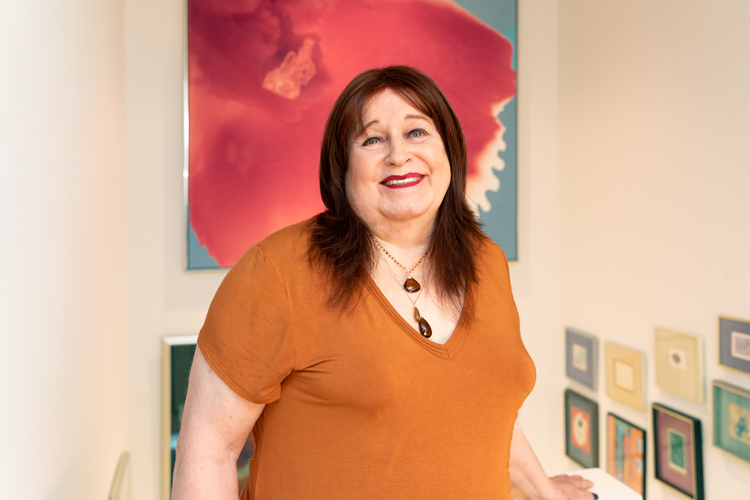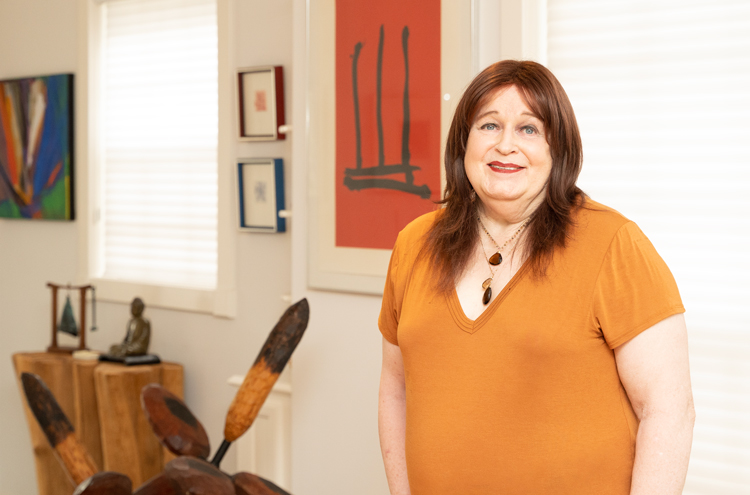Moving Forward
Alexis Melvin expands Transgender Foundation of America’s reach.

The Transgender Foundation of America (TFA) is a Houston-based nonprofit organization committed to improving the lives of transgender people. People from all over the world have received support from the group, including crisis grants, scholarships, and nonprofit incubation funding. Alexis Melvin, 74, has been president of the group since 2017.
“Our goal is to improve the lives of transgender people. That’s it. If someone else, or some other organization, is doing that, we will help them,” says Melvin.
The concept seems so simple, but the services that the organization provides or supports can be complex, especially for an organization that is run entirely by volunteers.
“One example is our trangender disaster-relief grant,” she adds. “During a disaster like Harvey, transgender people on average received services much later than their non-transgender counterparts. This is due to issues around name changes or various other things. It can sometimes delay things by one or two months. That is a real problem if the assistance you need is to get food on the table.”
TFA can trace its roots all the way back to 1965, but according to Melvin it has been in its current form since 1971. She became involved when the organization merged with the Houston Transgender Unity Committee. At the time, both organizations were serving the community in complementary ways, so merging operations and the board of directors made sense to reduce both groups’ overhead costs. The move also helped the Foundation streamline planning for its annual Unity Banquet—the event that the group is most widely known for.
The banquet, among many other services, had to be suspended during the pandemic, due in large part to the number of requests that the organization was getting for assistance. “During COVID, we [received] thousands of requests for assistance, compared to a typical year when a disaster like Harvey hits and we might get between six and thirty requests every couple of weeks,” says Melvin.
“We had a lot going on just as COVID hit. We are 100 percent volunteers, and there is a key set of volunteers who serve as the board of directors. They do a lot of the work overseeing the grants and how they are distributed. There were so many requests coming in that it started to make many of them sick. We had to sit down and look at what we could continue to do and what we had to cut. Those were hard choices, and we are just now gearing back up from [that crisis].”
One of the things that was cut was their successful podcast, The Transadvocate, which was established in 2002. The podcast became one of the foremost resources for information relating to the transgender community in the country, and it even gained a following in some parts of Canada, according to Melvin. They are hoping to revive the podcast this month.
Melvin can be heard hosting the podcast regularly, and she is hoping a new project will soon premiere that will help educate and inform the world about the impact that transgender people have had throughout history. The project will showcase the Transgender Archives, which are kept by the group and considered to be a significant source of community information.
“The show will be called TransHistory Roadshow. It will be styled after the Antiques Roadshow. We will pull items out of our archives and showcase them. This is being done, in part, to counter some politicians’ false ideas that transgender people are somehow a new phenomenon. Episode 2 will showcase newspapers from the [previous four centuries] with actual news stories about transgender people. We aren’t new,” Melvin emphasizes.

As the threat of COVID recedes, the TFA will resume offering scholarships, grants, and other supportive programming that helps improve the lives of transgender people. An inspiring aspect of the grants is the TFA board’s commitment to making access to these services as simple as possible. Some types of grants only need three of the seven board members to approve them. There are no long application forms that often create barriers to getting assistance.
“I have had a lot of people ask me whether there is enough vetting to make sure that we aren’t being taken advantage of,” Melvin admits. “I can tell you from experience that most of the time, you can tell in about the first minute if someone is actually in need or if they are trying to scam us. It’s almost funny, actually. Most of the time, the people that get the grants come back to us and tell us how they used it and how it helped them. So far, it has not been a problem.”
A new and improved TFA website is also in the works as the group continues to expand their outreach to better serve the transgender community.
More information on Transgender Foundation of America services, podcasts, and archives can be found on their Facebook page or at tfahouston.com.











FB Comments